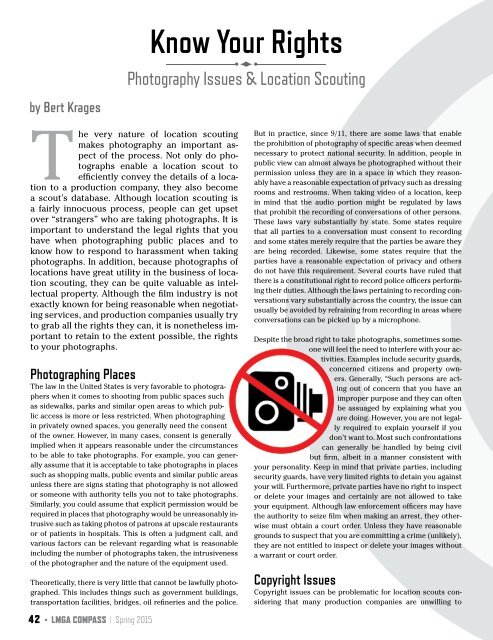LMGA-Compass-Spring-2015-New-1
LMGA-Compass-Spring-2015-New-1
LMGA-Compass-Spring-2015-New-1
You also want an ePaper? Increase the reach of your titles
YUMPU automatically turns print PDFs into web optimized ePapers that Google loves.
Know Your Rightsby Bert KragesPhotography Issues & Location ScoutingThe very nature of location scoutingmakes photography an important aspectof the process. Not only do photographsenable a location scout toefficiently convey the details of a locationto a production company, they also becomea scout’s database. Although location scouting isa fairly innocuous process, people can get upsetover “strangers” who are taking photographs. It isimportant to understand the legal rights that youhave when photographing public places and toknow how to respond to harassment when takingphotographs. In addition, because photographs oflocations have great utility in the business of locationscouting, they can be quite valuable as intellectualproperty. Although the film industry is notexactly known for being reasonable when negotiatingservices, and production companies usually tryto grab all the rights they can, it is nonetheless importantto retain to the extent possible, the rightsto your photographs.Photographing PlacesThe law in the United States is very favorable to photographerswhen it comes to shooting from public spaces suchas sidewalks, parks and similar open areas to which publicaccess is more or less restricted. When photographingin privately owned spaces, you generally need the consentof the owner. However, in many cases, consent is generallyimplied when it appears reasonable under the circumstancesto be able to take photographs. For example, you can generallyassume that it is acceptable to take photographs in placessuch as shopping malls, public events and similar public areasunless there are signs stating that photography is not allowedor someone with authority tells you not to take photographs.Similarly, you could assume that explicit permission would berequired in places that photography would be unreasonably intrusivesuch as taking photos of patrons at upscale restaurantsor of patients in hospitals. This is often a judgment call, andvarious factors can be relevant regarding what is reasonableincluding the number of photographs taken, the intrusivenessof the photographer and the nature of the equipment used.Theoretically, there is very little that cannot be lawfully photographed.This includes things such as government buildings,transportation facilities, bridges, oil refineries and the police.42 • <strong>LMGA</strong> COMPASS | <strong>Spring</strong> <strong>2015</strong>But in practice, since 9/11, there are some laws that enablethe prohibition of photography of specific areas when deemednecessary to protect national security. In addition, people inpublic view can almost always be photographed without theirpermission unless they are in a space in which they reasonablyhave a reasonable expectation of privacy such as dressingrooms and restrooms. When taking video of a location, keepin mind that the audio portion might be regulated by lawsthat prohibit the recording of conversations of other persons.These laws vary substantially by state. Some states requirethat all parties to a conversation must consent to recordingand some states merely require that the parties be aware theyare being recorded. Likewise, some states require that theparties have a reasonable expectation of privacy and othersdo not have this requirement. Several courts have ruled thatthere is a constitutional right to record police officers performingtheir duties. Although the laws pertaining to recording conversationsvary substantially across the country, the issue canusually be avoided by refraining from recording in areas whereconversations can be picked up by a microphone.Despite the broad right to take photographs, sometimes someonewill feel the need to interfere with your activities.Examples include security guards,concerned citizens and property owners.Generally, “Such persons are actingout of concern that you have animproper purpose and they can oftenbe assuaged by explaining what youare doing. However, you are not legallyrequired to explain yourself if youdon’t want to. Most such confrontationscan generally be handled by being civilbut firm, albeit in a manner consistent withyour personality. Keep in mind that private parties, includingsecurity guards, have very limited rights to detain you againstyour will. Furthermore, private parties have no right to inspector delete your images and certainly are not allowed to takeyour equipment. Although law enforcement officers may havethe authority to seize film when making an arrest, they otherwisemust obtain a court order. Unless they have reasonablegrounds to suspect that you are committing a crime (unlikely),they are not entitled to inspect or delete your images withouta warrant or court order.Copyright IssuesCopyright issues can be problematic for location scouts consideringthat many production companies are unwilling to


